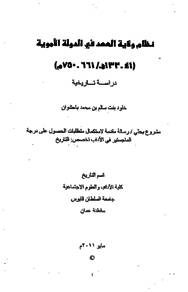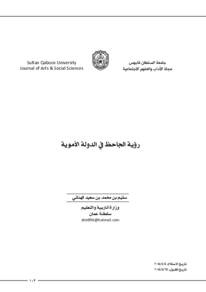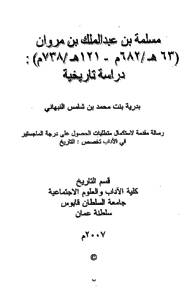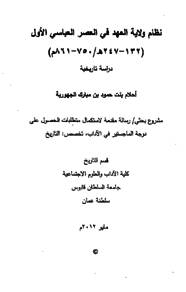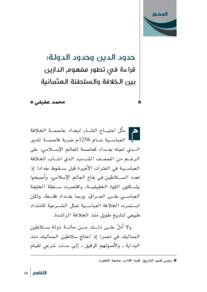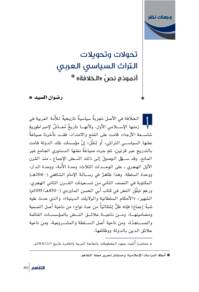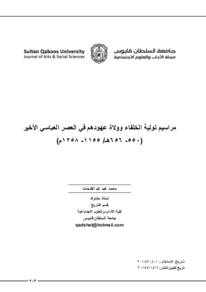Document
نظام ولاية العهد في الدولة الأموية( 41-132 هـ/661 هـ-750م)
Publisher
جامعة السلطان قابوس
Gregorian
2011
Language
Arabic
English abstract
This study aimes to shed light on the system of Succession in the Umayyad state, between 41 AH / 661 AD and 132 AH / 750 AD, which appeared in the Islamic state for the first time in the era of Caliph Muawiya bin Abi Sufyan who chose his son to become the caliph after him. The event that paved the way to the development of this succession system in the Umayyad state until it fell down in 132 AH / 750 AD In order to discuss this system in a more objective way, the researcher relied on the . original sources and some modern references. She also adapted historical approach depending on describing and analyzing some historical stories as well as comparing between opinions of modern contemporary historians on this particular subject. The study contains an introduction, preface, conclusion, and three chapters. Chapter I: the mandate of Succession in Sufyania period (41- 64 AH / 661- 683 m). The second chapter: the mandate of Succession in the Marwaani period (64- 125AH / 684- 743 AD). While the last chapter discusses the political chaos and the intensified conflict on the mandate of Succession in the period between (125-132 AH / 743- 750 AD).
The study concluded several results, some of them are: that the succession did exist among the Arabs before Islam, but it was not inherited, the adaptation of succession system in the Islamic state took various forms before the coming of the Umayyad state, that the inherited mandate of Succession appeared for the first time in the Islamic state at the time of the first Umayyad caliph Muawiya bin Abi Sufyan, the strong influence of tribalism on political decisions in the Umayyad dynasty, the strictness of the Umayyads to give the mandate to qualified figure who can take the responsibility, that the mandate of Succession in the Umayyad dynasty was not directly inherited like direct transition from father to son, but might moved to a brother, cousin or even one of the sons of another branch of the tribe as far as he is from the Umayyads, military commanders and governors played a significant role in the appointment of Caliph (successor), that the principle of the appointment of Suecessor of-the-successor-had-developed-in-the Umayyad-state until-it became a system that had conditions and rules. In the opinion of the researcher, the system of mandate in the Umayyad era was one of the main reasons behind the fall of the Umayyad dynasty.
Member of
Resource URL
Arabic abstract
هدفت هذه الدراسة إلى إلقاء الضوء على نظام ولاية العهد في الدولة الأموية في الفترة (41ه - 132ه/661م -750م)، والذي ظهر في الدولة الإسلامية لأول مرة حين عهد الخليفة معاوية بن أبي سفيان لابنه يزيد بولاية العهد من بعده، ومن ثم تتبع تطور هذا النظام في الدولة الأموية حتى سقوطها سنة 132ه/:750م. ولكي يتم مناقشة هذا النظام بطريقة أقرب للموضوعية، فإن الباحثة اعتمدت على المصادر الأولية وبعض المراجع الحديثة، واتبعت المنهج التاريخي القائم على الوصف والتحليل لبعض الروايات التاريخية، مع المقارنة بين آراء المؤرخين المحدثين حول موضوع الدراسة. وتحتوي هذه الدراسة على مقدمة، وتمهيد، وثلاثة فصول، وخاتمة. والفصول هي: الفصل الأول: ولاية العهد في الفترة السفيانية (41- 64 ه/ 661- 683 م). أما الفصل الثاني فخصص في: ولاية العهد في الفترة المروانية (64- 125 هـ/ 684- 743م). وبالنسبة للفصل الثالث والأخير فهو: الفوضى السياسية وتفاقم الصراع على ولاية العهد (125- 132ه 743- 750م). وقد خلصت الدراسة إلى نتائج عدة منها: أن الاستخلاف وجد عند العرب قبل الإسلام، ولكنه لم يتخذ الصورة الوراثية. اتخذ نظام الاستخلاف في الدولة الإسلامية قبل ظهور الأسرة الأموية صورة متعددة، أما نظام ولاية العهد الوراثية فقد ظهر لأول مرة في الدولة الإسلامية في زمن الخليفة الأموي الأول معاوية بن أبي سفيان. مدى قوة تأثير العصبية القبلية على القرار السياسي في الدولة الأموية. حرص الأمويون على أن يكون أولياء عهدهم يتصفون بصفات تؤهلهم لولاية العهد. أن ولاية العهد الأموية لم تتخذ منحى الوراثة المباشرة بحيث تنتقل السلطة من الأب إلى الابن، فقد تنتقل إلى الأخ او ابن العم أو حتى أحد أبناء الفرع الآخر شريطة ألا تخرج من الأسرة الأموية. لعب القادة العسكريين والولاة دور في تعيين ولي العهد الأموي. أن مبدأ تعيين ولي عهد الخليفة تطور في الدولة الأموية حتى أصبح نظام له شروط وقواعد، وبراي الباحثة أن نظام ولاية العهد الأموي كان أحد الأسباب الرئيسية لسقوط الدولة الأموية.
Category
Theses and Dissertations

